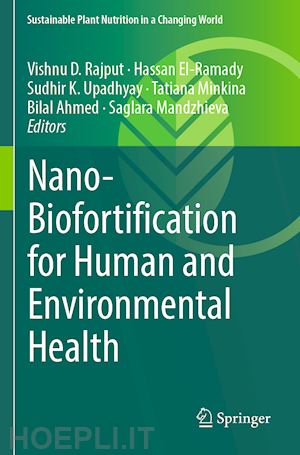
Questo prodotto usufruisce delle SPEDIZIONI GRATIS
selezionando l'opzione Corriere Veloce in fase di ordine.
Pagabile anche con Carta della cultura giovani e del merito, 18App Bonus Cultura e Carta del Docente
Nanotechnology has shown great potential to alleviate increasing pressure to meet food needs for our increasing human population, Novel agricultural innovations are required to enhance the health of edible crops and per unit area yield without impacting the associated environment in a negative way. Recent advancements in nanotechnology-based agricultural solutions have proven to help overcome the problems in agriculture that are associated with run-off of essential fertilizers from agricultural soils, low nutrient accumulation by crops, as well as to control insects, pests, and seasonal biotic factors, treatment of wastewater used for irrigation, plant uptake of xenobiotics (heavy metals, pesticides, industrial chemicals, drugs, and so on) that may be present in contaminated soils. Additionally, the consumption of such food crops may result in malnourishment and plant-mediated transfer of toxic substances among humans especially in underprivileged and rural populations.
Agents to stimulate plant growth include various types of nanomaterials such as carbon nanotubes, metal, and metal-oxide nanoparticles. Applications of particular nutrients or elements in crop plants can be shown to aid human nourishment (either by directly inducing its uptake or indirectly through enhancing the intracellular levels of other associated elements that ultimately boost the synthesis of the desired nutrient in plants).
It is also important to consider the competence and fate of nanomaterials in soil ecosystems. The entry route of nanomaterials into the environment includes both natural and anthropogenic sources. In order to achieve sustainable and safe use of nanotechnological products in agriculture, similar environmental conditions must be simulated on lab scale with the careful selection of organisms related to agriculture. Thus, emphasis should be placed on the judicial use of nano-enabled products without compromising the sustainability of the environment and human health. This comprehensive book highlights recent field research as well as contributions from academicians in the lab. This book addresses the major aspects related to nanotechnology, biofortification of crops, and human and environmental health.
Prof. Dr. Hassan El-Ramady is full Prof. of Soil fertility and Plant nutrition atKafrelsheikh Uni. His Ph.D. from Braunschweig Uni. Germany 2008. He is working mainly on the biological plant nutrition and how to overcome different problems in this field depending on the applications of nanotechnology particularly under stress. The area of scientific interest is Plant Nutrition and Soil Science, Biogeochemistry of Trace Elements in soils, and Environmental Soil Chemistry, Soil nano-remediation and nano-phytoremediation. He had several postdoctoral scholarships in Hungary, Germany, Italy (during the periods from 2012 to 2021), and attending several international Conferences like in the USA (2012 and 2014), Austria (2013), Brazil (2015), Germany (2004-2017). He shared as a member in many international societies from 2011 till now like American Society of Soil Science, German Society of Soil Science, German Society of Plant Nutrition, and member board of Egyptian Soil Science Society. Currently, he is Editor-in-Chief, Associate editor in some journal like Frontiers inSoil Science, Egyptian Journal of Soil Science (EJSS), Environment, Biodiversity and Soil Security (EBSS), beside a guest editor in some journal like Plants (Mdpi). He has peer reviewed more than 162 research or review articles for various international publication media, editor for about 200 articles, has several book chapters (30), more than 102 articles, 176 published materials. He was the lead editor of book “The Soils of Egypt”, which published by Springer 2019.
Dr. Sudhir K. Upadhyay working as a Assistant Professor in the Department of Environmental Sciences, V.B.S. Purvanchal University, Jaunpur, India since 18th September 2010. Dr. Upadhyay has more than 12 years of teaching and research experience at postgraduate level. He is an erudite scholar and a diligent researcher, worked in different CSIR and ICAR Laboratories. The working areas of Dr. Upadhyay are Microbial ecology, PGPR, Plant microbe-interaction, Eco-friendly amendments for management of degraded soil, Environmental pollution management and Restoration ecology. Dr. Upadhyay obtained his Ph.D. degree in Environmental Science from B. B. Ambedkar University Lucknow (A Central University), India. Dr. Upadhyay secured University Gold medal at PG level and also received four times young scientist awards. He is member of numerous societies and editor of numerous journals of National and International repute. He has published numerous research papers in the journals of National and International repute. Dr Upadhyay actively supervised dozens of researchers for his M.Sc. and M.Phil dissertation work including doctoral (Ph.D) students.
Prof. Dr. Tatiana Minkina is the Head of Soil science and land evaluation department of Southern federal university. The Head of International Master’s Degree Educational Program “Management and estimation of land resources” (2015-2022 years, accreditation by ACQUIN). The area of scientific interest is Soil Science, Biogeochemistry of Tra











Il sito utilizza cookie ed altri strumenti di tracciamento che raccolgono informazioni dal dispositivo dell’utente. Oltre ai cookie tecnici ed analitici aggregati, strettamente necessari per il funzionamento di questo sito web, previo consenso dell’utente possono essere installati cookie di profilazione e marketing e cookie dei social media. Cliccando su “Accetto tutti i cookie” saranno attivate tutte le categorie di cookie. Per accettare solo deterninate categorie di cookie, cliccare invece su “Impostazioni cookie”. Chiudendo il banner o continuando a navigare saranno installati solo cookie tecnici. Per maggiori dettagli, consultare la Cookie Policy.